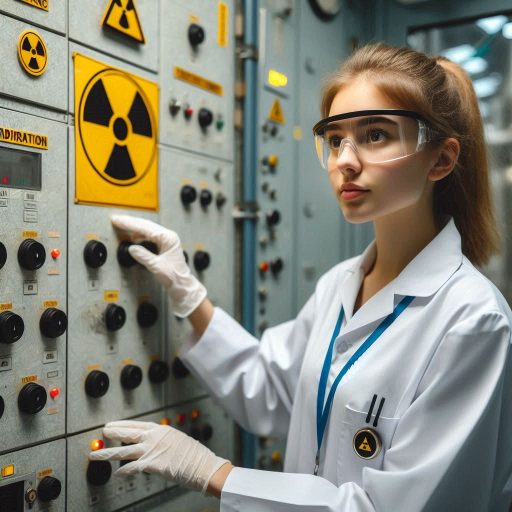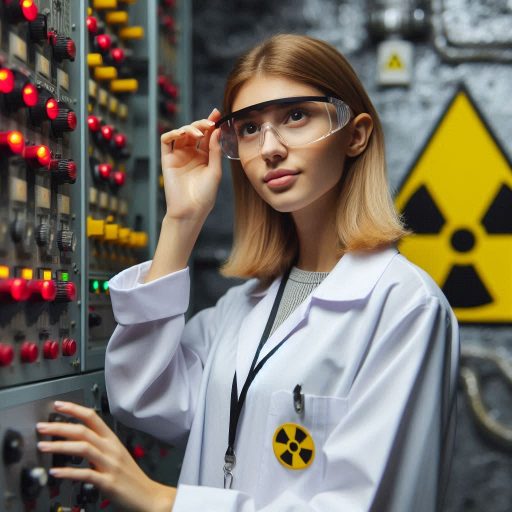Introduction
Nuclear scientists play a crucial role in the field of science and technology, particularly in the study and development of nuclear energy and its applications.
They are responsible for conducting research, analyzing data, and making significant contributions to various industries.
These scientists are instrumental in advancing our understanding of nuclear reactions, radiation, and nuclear materials.
They work tirelessly to ensure the safe operation of nuclear power plants, as well as to develop new materials and technologies for medical imaging, radioactive waste disposal, and nuclear medicine.
With their expertise, nuclear scientists also contribute to national security efforts by investigating nuclear proliferation and ensuring compliance with international agreements.
Their work helps to safeguard against potential threats and promote peaceful uses of nuclear energy.
Overall, nuclear scientists play a vital role in shaping the future of energy production, healthcare, and national security.
Their dedication and expertise are essential for addressing global challenges related to nuclear technology and ensuring a safe and sustainable future for the world.
Education and Training
Educational Requirements to Become a Nuclear Scientist
Becoming a nuclear scientist requires a solid educational foundation.
Most nuclear scientists hold at least a bachelor‘s degree in nuclear engineering, physics, or a related field.
This degree provides essential knowledge about nuclear reactions, radiation, and safety protocols.
Many universities offer specialized programs focusing on nuclear science, equipping students with practical skills.
Pursuing a master’s degree or Ph.D. can enhance career prospects.
Graduate programs often emphasize advanced research techniques and theoretical knowledge.
They allow students to engage in hands-on projects and internships, which are crucial for real-world experience.
Research opportunities during graduate studies often lead to publications, increasing job competitiveness.
Specialized Training and Certifications Needed
Specialized training plays a vital role in a nuclear scientist’s career.
Many employers look for candidates with specific expertise in areas like reactor physics or radiation protection.
Internships and co-op programs provide valuable experience in research labs and nuclear facilities.
These positions allow students to apply classroom knowledge to real-world scenarios, making them more attractive to employers.
Certifications can further distinguish a nuclear scientist.
The American Nuclear Society offers certification programs for professionals in the field.
These certifications demonstrate expertise and commitment to safety standards.
They also provide networking opportunities within the industry, fostering connections that can lead to job openings.
Importance of Continuous Learning and Staying Updated with Advancements in the Field
Continuous learning is essential for nuclear scientists.
The field of nuclear science evolves rapidly with advancements in technology and regulations.
Scientists must stay updated with the latest research and developments.
Attending conferences and workshops can enhance knowledge and skills.
Many professionals participate in ongoing education courses to maintain their certifications.
Reading industry publications and journals also aids in staying informed.
Subscribing to newsletters from organizations like the American Nuclear Society keeps professionals updated.
Networking with colleagues can lead to discussions about new methodologies and breakthroughs.
Engaging with online forums and communities offers additional insights into the field.
Moreover, employers often encourage professional development.
They may provide funding for further education or training courses.
Some companies require employees to complete specific training to remain compliant with safety regulations.
This support reflects the importance of staying current in the ever-evolving nuclear landscape.
In summary, aspiring nuclear scientists should prioritize a strong educational background.
Specialized training and certifications significantly enhance career prospects.
Continuous learning is vital in this dynamic field.
By committing to education and staying informed, nuclear scientists can thrive and contribute to advancements in nuclear science.
Read: Profiles in Success: Leading Chemists of the 21st Century in the US
Job Responsibilities
Nuclear scientists play a vital role in advancing our understanding of nuclear energy and radiation.
They conduct research to explore the potential and safety of nuclear technologies.
Their work often involves studying the effects of radiation on various materials and living organisms.
This research informs safety protocols and technological advancements in the field.
Conducting Research on Nuclear Energy and Radiation
Nuclear scientists conduct extensive research on nuclear energy and radiation.
They study the fundamental principles of nuclear reactions and their applications.
This research helps to uncover innovative uses for nuclear energy while ensuring safety measures are in place.
Their findings contribute to developing new technologies and enhancing existing ones.
Designing and Testing Nuclear Reactors
One of the primary responsibilities of nuclear scientists is designing and testing nuclear reactors.
They develop reactor concepts that maximize efficiency while minimizing risks.
These scientists use computer simulations and mathematical models to predict reactor behavior.
They also create physical prototypes to test these designs under controlled conditions.
This rigorous testing ensures that reactors operate safely and effectively.
Monitoring Nuclear Facilities for Safety and Compliance
Monitoring nuclear facilities is another critical responsibility.
Nuclear scientists ensure these facilities comply with safety regulations and operational standards.
They conduct regular inspections and audits to identify potential hazards.
If they detect any safety issues, they recommend corrective actions immediately.
Their vigilance helps prevent accidents and ensures the safe use of nuclear energy.
Analyzing Data and Performing Experiments
Analyzing data and performing experiments are core tasks for nuclear scientists.
They collect data from various sources, including experiments, simulations, and field studies.
Using sophisticated software and statistical methods, they interpret this data to draw meaningful conclusions.
These analyses contribute to scientific publications, helping to advance the field.
Nuclear scientists also design experiments to test hypotheses and validate theories.
Collaborating with Other Scientists and Engineers in Related Fields
Collaboration is essential in the work of nuclear scientists.
They often partner with engineers and other scientists in related fields.
This teamwork fosters a multidisciplinary approach to problem-solving.
Nuclear scientists share their findings and insights with colleagues to enhance project outcomes.
They may also engage with regulatory agencies to ensure compliance with safety standards.
In addition, nuclear scientists often participate in educational outreach programs.
They inform the public about nuclear energy and its benefits and risks.
By communicating their findings, they promote understanding and acceptance of nuclear technologies.
This outreach helps bridge the gap between science and society, fostering informed discussions about energy policy.
Essentially, nuclear scientists have diverse responsibilities that are crucial to the safe development of nuclear energy.
They conduct research, design and test reactors, and monitor safety.
Analyzing data and collaborating with other experts further enriches their work.
By fulfilling these responsibilities, nuclear scientists contribute significantly to advancements in energy and safety.
Their expertise ensures that nuclear technologies continue to evolve responsibly and sustainably.
Read: The Life and Times of a U.S. Physicist: A Day in Detail
Work Environment
Working in Laboratories, Universities, Government Facilities, and Private Sector Companies
Nuclear scientists work in diverse environments, including laboratories, universities, government facilities, and private sector companies.
These settings provide various resources and support for their research and development tasks.
Laboratories often serve as primary workplaces, where scientists conduct experiments and analyze samples.
In universities, they engage in teaching and mentoring students while conducting groundbreaking research.
Government facilities may focus on regulatory oversight and public safety, while private sector companies often emphasize innovation and technology development.
Following Strict Safety Protocols and Procedures to Prevent Exposure to Radiation
Safety is paramount in the nuclear science field.
Scientists follow strict safety protocols to prevent exposure to radiation.
They utilize protective gear, such as lab coats, gloves, and safety goggles.
Regular training ensures that all team members understand safety procedures.
Scientists must remain vigilant about potential hazards in their work environment.
This commitment to safety safeguards their health and well-being.
Long Hours and Occasional Travel for Fieldwork or Conferences
Working hours can be long, reflecting the demanding nature of the profession.
Nuclear scientists often spend significant time in laboratories or offices analyzing data.
They may also work during evenings or weekends to meet project deadlines.
In addition, scientists occasionally travel for fieldwork or conferences.
These trips may involve collecting samples from remote locations or attending industry events.
Travel allows them to present research findings and collaborate with other experts.
Collaborating with a Team of Professionals to Achieve Common Goals
Collaboration plays a crucial role in a nuclear scientist’s work environment.
They often work in teams, sharing knowledge and expertise to achieve common goals.
Team members may include physicists, chemists, engineers, and regulatory specialists.
This interdisciplinary approach fosters innovation and leads to comprehensive solutions.
Regular meetings facilitate communication and progress tracking among team members.
Collaborative projects enhance learning and enable scientists to tackle complex challenges.
In fact, the work environment of a nuclear scientist is dynamic and multifaceted.
It combines laboratory research, safety protocols, long hours, and collaborative efforts.
Scientists thrive in diverse settings, from academia to private companies.
They prioritize safety while advancing knowledge in their field.
Through teamwork and dedication, nuclear scientists contribute significantly to scientific progress and public safety.
Read: Salary Ranges: What to Expect as a Physicist in the USA

Specializations in the Field
Nuclear scientists often specialize in various areas, each contributing to a vital part of the industry.
Their work impacts energy production, medical advancements, environmental safety, and national security.
Nuclear Reactor Design and Operation
Nuclear reactor design and operation is one of the primary specializations.
Scientists in this field create reactors that generate electricity efficiently and safely.
They analyze reactor physics, thermodynamics, and fluid mechanics.
These professionals ensure that reactors operate within safety regulations.
They also work on improving reactor designs to increase efficiency and sustainability.
Continuous monitoring and assessment of reactor performance are critical.
Their work directly influences energy production and environmental impact.
Nuclear Waste Disposal and Management
Another essential specialization is nuclear waste disposal and management.
Scientists in this area focus on safely storing and disposing of nuclear waste.
They develop strategies for waste containment and isolation.
Understanding the long-term effects of waste is crucial in their research.
These professionals assess potential environmental impacts from waste storage.
They also work on technologies to reduce waste volume and toxicity.
Their goal is to ensure public safety and environmental protection.
Transform Your Career Today
Unlock a personalized career strategy that drives real results. Get tailored advice and a roadmap designed just for you.
Start NowRadiation Therapy and Medical Imaging
Radiation therapy and medical imaging are crucial specializations in healthcare.
Nuclear scientists develop and enhance techniques for diagnosing and treating diseases.
They create radiation-based therapies for cancer treatment.
Their work involves calculating precise radiation doses for patients.
They also innovate medical imaging techniques, such as PET and MRI scans.
These advancements improve diagnostic accuracy and patient outcomes.
By collaborating with healthcare professionals, they contribute to medical innovations.
Nuclear Fusion Research
Nuclear fusion research represents an exciting frontier in nuclear science.
Scientists in this field explore the potential of fusion as a clean energy source.
They study the conditions necessary for fusion to occur and sustain.
This research aims to replicate the sun’s energy production process.
Scientists design experiments and analyze data to understand fusion better.
Successful fusion could revolutionize energy production and significantly reduce carbon emissions.
Nuclear Weapons Development and Non-Proliferation Efforts
Finally, some nuclear scientists specialize in weapons development and non-proliferation efforts.
They focus on understanding nuclear weapons and their implications.
Their work involves researching and developing safeguards against proliferation.
They analyze the global landscape of nuclear capabilities.
Scientists in this field work with governments and international organizations.
Their goal is to promote disarmament and prevent the spread of nuclear weapons.
This specialization is vital for global security and peace.
In short, nuclear science encompasses various specializations.
Each plays a crucial role in energy, healthcare, environmental safety, and security.
These professionals continue to advance their fields, addressing pressing global challenges.
Their contributions have far-reaching implications for society.
Read: Physics Specializations: Choosing Your Path in the U.S.
Skills and Qualities
Strong Analytical and Problem-Solving Skills
A nuclear scientist must possess strong analytical and problem-solving skills.
They analyze complex data and interpret results to draw conclusions.
This skill is crucial for addressing intricate challenges in nuclear research and technology.
Nuclear scientists often encounter unexpected issues that require innovative solutions.
Their ability to think critically enables them to navigate these challenges effectively.
Attention to Detail and Precision
Attention to detail and precision is essential in this field.
Nuclear scientists work with highly sensitive materials and processes.
A minor error can have significant consequences.
They must ensure all calculations and measurements are accurate.
This attention to detail fosters safety and reliability in their work.
Nuclear scientists must meticulously follow protocols and procedures to maintain precision in experiments and analyses.
Ability to Work Under Pressure and Meet Deadlines
The ability to work under pressure and meet deadlines is another vital quality.
Nuclear scientists often face tight schedules for research and project completion.
They must balance multiple tasks and prioritize effectively.
Adapting to changing circumstances is essential in a fast-paced environment.
Their capacity to stay focused amid pressure ensures that projects progress smoothly and meet regulatory timelines.
Excellent Communication and Teamwork Skills
Excellent communication and teamwork skills are also critical for nuclear scientists.
They frequently collaborate with engineers, technicians, and regulatory agencies.
Clear communication is necessary to share complex ideas and findings.
Nuclear scientists present their research to diverse audiences, including peers and stakeholders.
They must convey technical information in an understandable way.
This skill facilitates collaboration and enhances project success.
Ethical and Responsible Conduct in Handling Radioactive Materials
Ethical and responsible conduct is paramount when handling radioactive materials.
Nuclear scientists must adhere to strict safety protocols and regulations.
They ensure the safe use and disposal of radioactive substances.
Ethical considerations guide their research and decision-making processes.
They prioritize public safety and environmental protection in their work.
This commitment to ethics fosters trust within the scientific community and the public.
All in all, the skills and qualities of a nuclear scientist encompass various critical areas.
Strong analytical and problem-solving skills empower them to address complex issues.
Attention to detail ensures precision in their work, minimizing risks.
Their ability to work under pressure helps meet deadlines without sacrificing quality.
Effective communication and teamwork facilitate collaboration in multidisciplinary environments.
Finally, ethical conduct ensures responsible handling of radioactive materials.
These qualities collectively enable nuclear scientists to contribute meaningfully to their field.
Career Outlook and Opportunities
Growing Demand for Nuclear Scientists in Various Industries
The career outlook for nuclear scientists is bright and promising.
Various industries increasingly recognize the value of nuclear science.
This demand arises from a global push for clean energy solutions and advancements in medical technology.
As countries aim to reduce carbon emissions, nuclear power remains a viable alternative.
Job Prospects in Research Institutions, Government Agencies, Energy Companies, and Healthcare Facilities
Job prospects for nuclear scientists span multiple sectors.
Research institutions often seek scientists to conduct groundbreaking studies.
Government agencies also hire professionals to develop policies and regulations related to nuclear energy.
Energy companies need experts to optimize nuclear reactors and ensure safety protocols.
Healthcare facilities employ nuclear scientists to support advancements in nuclear medicine, including cancer treatment and diagnostic imaging.
Opportunities for Advancement to Higher Positions with Experience and Expertise
Nuclear scientists enjoy numerous opportunities for career advancement.
As they gain experience, they can move into higher positions.
Many professionals transition to leadership roles, overseeing projects and guiding teams.
Specialized knowledge in areas like reactor design or radiation safety can also lead to senior-level roles.
Such positions often come with increased responsibilities and higher salaries.
Potential for International Collaborations and Projects in Nuclear Science
The potential for international collaboration enriches the field of nuclear science.
Many projects require scientists to work with global teams.
Collaborating with international colleagues allows scientists to share knowledge and techniques.
This exchange fosters innovation and helps advance nuclear technologies worldwide.
Scientists involved in international projects often gain unique perspectives on global challenges and solutions.
As industries evolve, so do the roles of nuclear scientists.
Emerging technologies, such as small modular reactors and fusion energy, offer new career paths.
Scientists who stay current with these advancements can position themselves as industry leaders.
Continuous education and training become vital for remaining competitive in this dynamic field.
Networking plays a crucial role in career growth.
Attending conferences and joining professional organizations allows scientists to connect with peers.
These connections can lead to job opportunities and collaborations.
Engaging with the broader scientific community enhances professional development.
In essence, the career outlook for nuclear scientists is robust and full of possibilities.
The growing demand for experts in various industries signals a bright future.
Opportunities abound in research, government, energy, and healthcare sectors.
With experience, nuclear scientists can advance to higher roles, taking on leadership positions.
International collaborations further enhance the field, promoting innovation and knowledge sharing.
For those passionate about nuclear science, a rewarding career awaits.
Learn More: Day in the Life of an Immunologist
Challenges and Ethical Considerations
Nuclear scientists face significant challenges in their field.
One major issue involves addressing public concerns about nuclear energy and radiation safety.
Many people fear the potential dangers of radiation exposure.
These fears often stem from past nuclear accidents, such as Chernobyl and Fukushima.
To gain public trust, scientists must communicate effectively about safety measures and risk management.
Addressing Public Concerns About Nuclear Energy and Radiation Safety
Dealing with public concerns is a priority for nuclear scientists.
They must engage in open dialogue to address fears and misconceptions.
Public education about radiation safety can help alleviate anxieties.
Scientists should share information about safety protocols and emergency preparedness.
By fostering trust, they can promote a more informed perspective on nuclear energy.
Dealing with the Risks and Consequences of Nuclear Accidents or Misuse
Dealing with the risks of nuclear accidents is another critical challenge.
Nuclear power plants operate under strict safety protocols.
However, accidents can still occur due to human error or natural disasters.
When these events happen, the consequences can be severe, affecting human lives and the environment.
Scientists and policymakers must develop comprehensive emergency response plans to mitigate these risks.
Ensuring Ethical Conduct and Compliance with Regulations in Nuclear Research and Development
Ethical considerations play a crucial role in nuclear research and development.
Ensuring ethical conduct requires adherence to strict regulations and guidelines.
Nuclear scientists must prioritize transparency and integrity in their work.
This commitment helps build public confidence in the safety of nuclear technology.
Moreover, ethical considerations extend to the disposal of nuclear waste.
Scientists must find responsible ways to manage and dispose of radioactive materials.
Balancing the Benefits of Nuclear Technology with Potential Environmental and Health Risks
Another significant challenge is balancing the benefits of nuclear technology with potential environmental and health risks.
Nuclear energy provides a low-carbon alternative to fossil fuels.
It can help combat climate change by reducing greenhouse gas emissions.
However, the potential for radiation exposure poses health risks.
Scientists must carefully evaluate the trade-offs associated with nuclear energy.
Public education is vital in addressing these challenges.
Scientists should engage with communities to share knowledge about nuclear energy’s benefits and risks.
By fostering open dialogue, they can alleviate fears and misconceptions.
This communication can also encourage informed decision-making among stakeholders.
Regulatory compliance is essential in maintaining safety standards.
Nuclear scientists must stay updated on laws and regulations governing their work.
They should participate in continuous education to ensure they follow best practices.
This commitment to compliance helps prevent unethical practices that could jeopardize public safety.
Overall, nuclear scientists confront various challenges and ethical considerations.
They must address public concerns, manage risks from accidents, and ensure ethical conduct.
Balancing the advantages of nuclear technology with environmental and health risks is crucial.
By engaging with the public and adhering to regulations, they can build trust and contribute to a safer future.
Conclusion
Nuclear scientists play vital roles in various fields, including energy, medicine, and research.
They conduct experiments to understand nuclear reactions and radiation.
Their work helps improve nuclear energy efficiency and safety.
Scientists also develop new technologies for medical applications, such as cancer treatment.
They contribute to understanding radiation effects on human health and the environment.
Nuclear scientists frequently collaborate with engineers and health professionals.
Together, they design safer reactors and develop medical devices.
They also ensure that nuclear materials are used responsibly and safely.
Their expertise is crucial for developing regulatory standards that protect public health.
By analyzing data and conducting simulations, nuclear scientists advance our understanding of complex nuclear phenomena.
The importance of nuclear scientists extends beyond traditional roles.
They work on innovations in nuclear fusion, promising a cleaner energy source.
This research can potentially revolutionize how we generate energy.
Additionally, nuclear scientists play essential roles in national security.
They help ensure nuclear non-proliferation and manage the safe disposal of nuclear waste.
Nuclear science significantly impacts various industries, from energy production to healthcare.
The work of these scientists leads to breakthroughs that enhance quality of life.
Their contributions advance scientific knowledge and technology on a global scale.
Without their expertise, many of today‘s technological advancements would not exist.
Transform Your Career Today
Unlock a personalized career strategy that drives real results. Get tailored advice and a roadmap designed just for you.
Start Now[E-Books for Sale]
The Big Book of 500 High-Paying Jobs in America: Unlock Your Earning Potential
$19.99 • 500 High-Paying Jobs • 330 pages
Explore 500 high-paying jobs in America and learn how to boost your career, earn more, and achieve success!
See All 500 High-Paying Jobs of this E-Book
1001 Professions Without a Degree: High-Paying American Jobs You Can Start Now
$19.99 • 1001 Professions Without a Degree • 174 pages
Discover 1001 high-paying jobs without a degree! Unlock career tips, skills, and success strategies for just $19.99!




